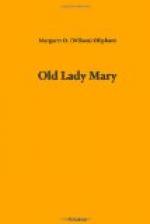Among the articles given away was the Italian cabinet, which the vicar had always had a fancy for; and naturally it had not been in the vicarage a day, before the boys insisted on finding out the way of opening the secret drawer. And there the paper was found, in the most natural way, without any trouble or mystery at all.
XV.
They all gathered to see the wanderer coming back. She was not as she had been when she went away. Her face, which had been so easy, was worn with trouble; her eyes were deep with things unspeakable. Pity and knowledge were in the lines, which time had not made. It was a great event in that place to see one come back who did not come by the common way. She was received by the great officer who had given her permission to go, and her companions who had received her at the first all came forward, wondering, to hear what she had to say; because it only occurs to those wanderers who have gone back to earth of their own will, to return when they have accomplished what they wished, or it is judged above that there is nothing possible more. Accordingly, the question was on all their lips, “You have set the wrong right,—you have done what you desired?”
“Oh,” she said, stretching out her hands, “how well one is in one’s own place! how blessed to be at home! I have seen the trouble and sorrow in the earth till my heart is sore, and sometimes I have been near to die.”
“But that is impossible,” said the man who had loved her.
“If it had not been impossible, I should have died,” she said. “I have stood among people who loved me, and they have not seen me nor known me, nor heard my cry. I have been outcast from all life, for I belonged to none. I have longed for you all, and my heart has failed me. Oh how lonely it is in the world, when you are a wanderer, and can be known of none—”
“You were warned,” said he who was in authority, “that it was more bitter than death.” “What is death?” she said; and no one made any reply. Neither did any one venture to ask her again whether she had been successful in her mission. But at last, when the warmth of her appointed home had melted the ice about her heart, she smiled once more and spoke.
“The little children knew me. They were not afraid of me; they held out their arms. And God’s dear and innocent creatures—” She wept a few tears, which were sweet after the ice tears she had shed upon the earth. And then some one, more bold than the rest, asked again, “And did you accomplish what you wished?”
She had come to herself by this time, and the dark lines were melting from her face. “I am forgiven,” she said, with a low cry of happiness. “She whom I wronged, loves me and blessed me; and we saw each other face to face. I know nothing more.”
“There is no more,” said all together. For everything is included in pardon and love.




